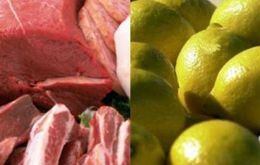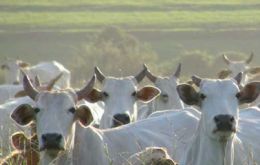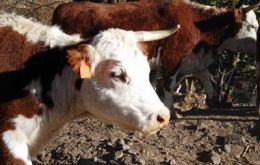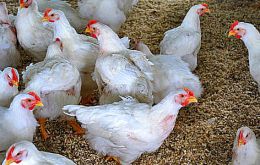MercoPress. South Atlantic News Agency
Tag: beef export
-
Wednesday, November 7th 2012 - 22:42 UTC
India becomes main world beef exporter in 2012, and probably 2013

While the mantle of the world largest beef exporting nation has traditionally been a three-way race between Australia, Brazil and the US, 2012 has seen India race ahead of the pack, with expectations for Indian beef exports to grow again in 2013.
-
Saturday, September 1st 2012 - 06:25 UTC
WTO says Argentina officially lodged a beef dispute against the US

Argentina on Thursday officially lodged a dispute against US restrictions on imports of Argentinean beef and other meat products, the World Trade Organization (WTO) said on Friday.
-
Tuesday, August 28th 2012 - 04:03 UTC
Brazil beef exports reached 5.37bn dollars in 2011, but volume was down 10.8%

Last year was very positive for Brazil beef exports having jumped from 4.8 billion dollars in 2010 to 5.37 billion in 2011, which represents an 11.65% increase according to Abicec, the Brazilian Association of Meat exporting industries.
-
Wednesday, June 20th 2012 - 00:35 UTC
Uruguay meat exports so far this year total 195.459 tons and 766 million dollars

Uruguay meat exports so far this year (June 9) represented 766 million dollars which is slightly higher that the same period last year when the sum was 722 million dollars; likewise tonnage was 195.459 compared to 184.749 tons in 2011.
-
Wednesday, February 1st 2012 - 17:32 UTC
Brazilian beef exports declined 14% in 2011 to 820.239 tons

Brazilian beef exports declined 14% in 2011, to 820.239 tonnes swt, establishing it as the world’s third largest beef exporter behind Australia and the US (Global Trade Atlas).
-
Thursday, January 12th 2012 - 14:12 UTC
Uruguay 2011 beef exports dropped 8% in volume, lowest since 2004

Uruguay beef exports last year dropped 8% in volume but soared 18% in value because of higher international prices and fewer cattle. However the volume was the lowest since 2004 and confirms a decreasing tendency since 2006, according to the latest figures released by the government.
-
Thursday, December 15th 2011 - 03:50 UTC
Uruguay meat exports reach 1.5 billion dollars in eleven months

In eleven months of 2011 Uruguayan meat exports jumped 21% in value compared to the same period a year ago, totalling 1.505 billion dollars and 373.548 tons according to the latest release from the country’s National Meat Board (INAC).
-
Friday, December 2nd 2011 - 20:01 UTC
Paraguay’s November inflation index negative helped by a glut of beef

Paraguay experienced negative inflation during the month of November influenced by the fall in meat prices, mainly beef, because of a ban on exports, which more than compensated an increase in fuel costs.
-
Tuesday, November 1st 2011 - 22:57 UTC
Argentina among top world exporters of chicken meat, while beef loses clout

Argentina is currently ranked among the world’s top six exporters of chicken meat (breast and legs) while in beef has dropped to position nine, according to the latest data from the US Department of Agriculture, USDA.
-
Tuesday, October 4th 2011 - 20:38 UTC
Weaker Real expected to bolster Brazil’s meat sector exports

A weaker Brazilian Real should give companies in Brazil's meat sector more flexibility to increase export volumes and could also provide a short-term boost to margins.
